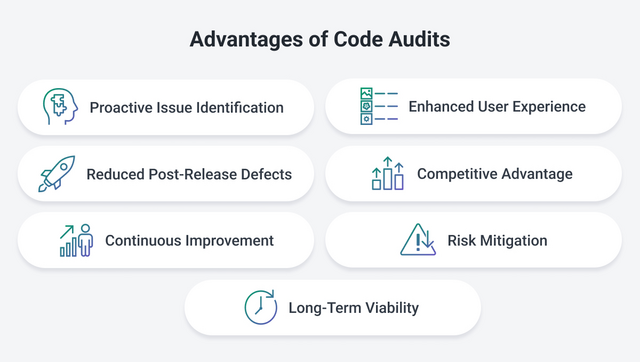In the fast-paced realm of modern business – where mergers, acquisitions, and technological integrations are frequent occurrences – the integrity of software systems stands as a cornerstone for sustainable growth.
When companies embark on mergers or acquisitions, the invisible backbone of these transactions lies within the software systems they inherit. These systems hold the keys to seamless integration or potential hurdles.
Enter the code audit, a powerful investigative tool that goes beyond a routine check-up. Think of it as your digital detective, meticulously examining software quality and stability.
The Significance of Code Audits
1. Uncovering Legacy Challenges
Code audits serve as a cornerstone of due diligence in the ticketing sector. Before diving into business transactions, you must understand exactly what you are acquiring, integrating with, or selling. Code audits allow you to peer into the intricate layers of code, uncover vulnerabilities, and pinpoint areas for enhancement.
When dealing with potentially outdated legacy systems, third-party code audits offer a comprehensive and impartial evaluation, shedding light on potential challenges during integration.
2. Strategic Decision-Making
Beyond a surface-level assessment, code audits help decision-makers understand whether a dated application requires a complete redevelopment or can be sustained with minor adjustments.
They’re not just reports; they’re treasure troves of insights, lighting the path toward better decision-making and sustainable business growth.
3. Quality Assurance Audits
In tandem with code assessments, Quality Assurance (QA) audits can be extremely helpful. While code audits focus solely on code quality, quality assurance audits focus on identifying bugs, assessing code stability, and evaluating the basic performance of software.
Conducting QA audits alongside code assessments ensures a holistic understanding of the software’s health, addressing both structural and functional aspects.
The Code Audit Process
The journey of a code audit begins with meticulous planning—a strategic roadmap for exploring the software landscape. It involves gathering documentation, understanding the software’s architecture, and carefully defining the scope of the audit.
Once underway, auditors employ specialized tools as their guides, meticulously dissecting both front-end and back-end code. Their mission? To evaluate code structure and maintainability, identify issues like security vulnerabilities or performance concerns, and uncover optimization opportunities.
Auditors then create a detailed report during this phase, outlining discovered issues and providing recommendations for resolution, serving as a roadmap for addressing problems.
Remember, code audits are not a one-time event but an ongoing process. Regular assessments and improvements to the codebase are essential for maintaining code quality, enhancing security, and supporting efficient system performance.
Code Audit Deliverables
Depending on the project requirements, a code audit report can include:
- Software code analysis
- Architecture analysis – including strengths and weaknesses
- Security audit
- Automation tests audit and pentest review
- Design review
- Software audit checklist
- Document with findings from each phase of the assessment
- Recommendations for improving the assessed quality attributes
Common Issues Found in Code Audits
Most companies that have their code audited experience some of these common issues. Within this section, we delve into these common challenges and offer solutions to address them effectively:
1. Consistency & Readability
Issue: Varied code styles impacting readability and maintainability.
Solution: Enforce a consistent style guide, and conduct regular code reviews.
2. Security
Issue: Vulnerabilities risking data compromise or system breaches.
Solution: Implement security best practices, data validation, encryption, and regular updates.
3. Maintainability & Complexity
Issue: Duplicate, unused, or unnecessary code hindering maintenance.
Solution: Eliminate duplication, and use functions/libraries for better maintainability.
4. Documentation & Understanding
Issue: Inadequate comments make code understanding challenging. There may also be outdated dependencies (libraries, packages, etc.).
Solution: Provide clear comments, create detailed documentation for code clarification, and suggest modern packages and libraries.
5. Logic Errors & Testing
Issue: Code not producing intended results leading to errors and crashes.
Solution: Thoroughly test code, involve multiple developers for review, and implement error handling.
6. Architecture & Scalability
Issue: Inefficient design impacting scalability and maintenance.
Solution: Follow industry best practices for better scalability and maintenance.
7. Performance Optimization
Issue: Poorly optimized code causing slow performance and increased costs.
Solution: Regularly optimize code with performance strategies.

Code Audits for Buyers
For potential buyers in the event ticketing industry, a code audit is indispensable. It offers a deep dive into the quality and security of the software being acquired, providing insights that can influence investment decisions and future growth.
It’s much better to find if there are issues in the code before making a purchase – at this point, you can reconsider the deal or assess the capability to implement necessary changes or updates to the software.
For a thorough and accurate evaluation, conducting a code audit by an independent third-party company is crucial. This approach ensures an unbiased opinion, free from any vested interest in the M&A. Using a reputable third-party code audit service will significantly reduce the risk of encountering unforeseen challenges post-acquisition.
We recently had a client experience a situation that underscored the value of an independent third-party audit to avoid post-acquisition issues. Our client rushed into the integration of two third-party software solutions without proper due diligence, leading to major compatibility issues.
Seeking assistance, they approached Softjourn to navigate these complex integrations resulting from unvetted software acquisitions. We proposed a three-month in-depth integration definition period, during which our engineers delved into the code bases, and conducted thorough compatibility testing, comprehensive debugging, and detailed audits.
In the end, we provided helpful recommendations aligned with the client’s business goals for necessary upgrades and efficient integration paths.
Code Audits for Sellers
Sellers, too, stand to gain significantly from code audits. Conducting an audit before selling helps showcase the software’s quality, boosting its value and credibility.
Additionally, a code audit allows sellers to proactively address any hidden issues that could potentially damage their reputation post-sale. This helps a seller come to the negotiation table with confidence in the code of their product.
We often see how code audit services play a crucial role in securing a more successful deal for our clients. For example, a client wanted us to conduct a code audit before selling their software, to ensure their platform’s code met standards, eliminating potential surprises during negotiations.
Our code audit services identified critical bottlenecks, providing our client assurance in securing a successful deal.
Choosing a Code Audit Service
Selecting a code audit service necessitates careful consideration. Look for code audit services with a proven track record in conducting code audits, especially if they have experience in your industry. Reputation, experience, cost, audit timeline, and support levels should all be evaluated.
Before engaging a code audit service, inquire about their processes, methodologies, and tools. Seek information on their experience with similar ticketing software products and any specific expertise relevant to the industry.
Final Word
When taking the huge step of merging, acquiring, or integrating, a code audit is not just a prudent step; it’s a necessity. Whether you are a buyer or seller, investing in a comprehensive code audit ensures that software is robust, secure, and aligned with industry standards.
It will provide the insights needed to make informed decisions and can be the differentiator that shapes the success of your business transaction.




















